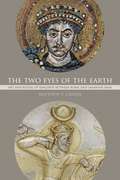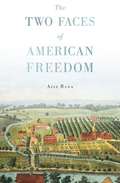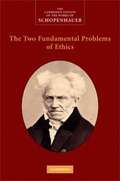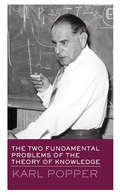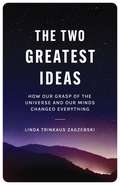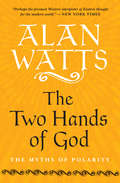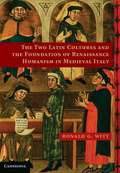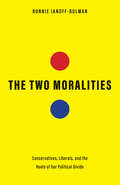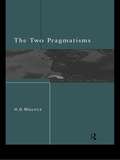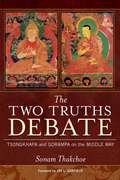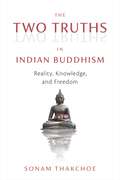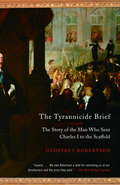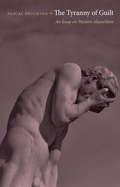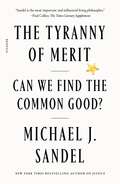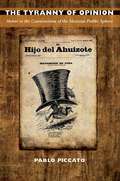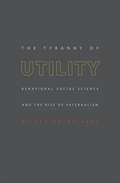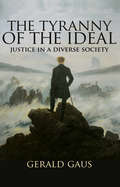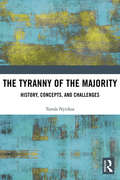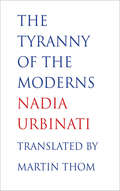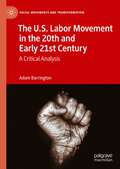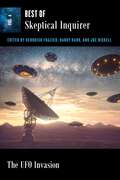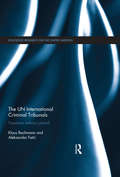- Table View
- List View
The Twilight of the Idols and the Anti-Christ
by Friedrich Nietzsche R. J. Hollingdale"Twilight of the Idols", an attack on all the prevalent ideas of his time, offers a lightning tour of Nietzsche's whole philosophy. It also prepares the way for "The Anti-Christ", a final assault on institutional Christianity. Both works show Nietzsche lashing out at self-deception, astounded at how often morality is based on vengefulness and resentment. Both reveal a profound understanding of human mean-spiritedness which still cannot destroy the underlying optimism of Nietzsche, the supreme affirmer among the great philosophers.
The Two Cultures
by C. P. SnowThe notion that our society, its education system and its intellectual life, is characterised by a split between two cultures - the arts or humanities on one hand, and the sciences on the other - has a long history. But it was C. P. Snow's Rede lecture of 1959 that brought it to prominence and began a public debate that is still raging in the media today. This 50th anniversary printing of The Two Cultures and its successor piece, A Second Look (in which Snow responded to the controversy four years later) features an introduction by Stefan Collini, charting the history and context of the debate, its implications and its afterlife. The importance of science and technology in policy run largely by non-scientists, the future for education and research, and the problem of fragmentation threatening hopes for a common culture are just some of the subjects discussed.
The Two Eyes of the Earth: Art and Ritual of Kingship between Rome and Sasanian Iran
by Matthew P. CanepaThis pioneering study examines a pivotal period in the history of Europe and the Near East and investigates the shared ideal of sacred kingship that emerged in the late Roman and Persian empires and explores the artistic, ritual, and ideological interactions between Rome and the Iranian world under the Sasanian dynasty.
The Two Faces of American Freedom
by Aziz RanaThe Two Faces of American Freedom reinterprets the American political tradition from the colonial period to modern times, placing issues of race relations, immigration, and presidentialism in the context of shifting notions of empire and citizenship. Rana envisions a democratic society that revives settler ideals, but combines them with meaningful inclusion for those currently at the margins of American life.
The Two Fundamental Problems of Ethics
by Arthur Schopenhauer Christopher JanawayThe purpose of the Cambridge Edition of the Works of Schopenhauer is to offer translations of the best modern German editions of Schopenhauer's work in a uniform format suitable for Schopenhauer scholars, together with philosophical introductions and full editorial apparatus. Arthur Schopenhauer's The Two Fundamental Problems of Ethics (1841) consists of two groundbreaking essays: On the Freedom of the Will and On the Basis of Morals. The essays make original contributions to ethics and display Schopenhauer's erudition, prose-style and flair for philosophical controversy, as well as philosophical views that contrast sharply with the positions of both Kant and Nietzsche. Written accessibly, they do not presuppose the intricate metaphysics which Schopenhauer constructs elsewhere. This is the first English edition of these works to re-unite both essays in one volume. It offers a new translation by Christopher Janaway, together with an introduction, editorial notes on Schopenhauer's vocabulary and the different editions of his essays, a chronology of his life, a bibliography and a glossary of names.
The Two Fundamental Problems of the Theory of Knowledge (Routledge Classics)
by Karl Popper Troels Eggers HansenIn a letter of 1932, Karl Popper described Die beiden Grundprobleme der Erkenntnistheorie – The Two Fundamental Problems of the Theory of Knowledge – as ‘…a child of crises, above all of …the crisis of physics.’ Finally available in English, it is a major contribution to the philosophy of science, epistemology and twentieth century philosophy generally.The two fundamental problems of knowledge that lie at the centre of the book are the problem of induction, that although we are able to observe only a limited number of particular events, science nevertheless advances unrestricted universal statements; and the problem of demarcation, which asks for a separating line between empirical science and non-science. Popper seeks to solve these two basic problems with his celebrated theory of falsifiability, arguing that the inferences made in science are not inductive but deductive; science does not start with observations and proceed to generalise them but with problems, which it attacks with bold conjectures. The Two Fundamental Problems of the Theory of Knowledge is essential reading for anyone interested in Karl Popper, in the history and philosophy of science, and in the methods and theories of science itself.
The Two Greatest Ideas: How Our Grasp of the Universe and Our Minds Changed Everything (Soochow University Lectures in Philosophy #6)
by Linda Trinkaus ZagzebskiTwo simple yet tremendously powerful ideas that shaped virtually every aspect of civilizationThis book is a breathtaking examination of the two greatest ideas in human history. The first is the idea that the human mind can grasp the universe. The second is the idea that the human mind can grasp itself. Acclaimed philosopher Linda Zagzebski shows how the first unleashed a cultural awakening that swept across the world in the first millennium BCE, giving birth to philosophy, mathematics, science, and virtually all the major world religions. It dominated until the Renaissance, when the discovery of subjectivity profoundly transformed the arts and sciences. This second great idea governed our perception of reality up until the dawn of the twenty-first century.Zagzebski explores how the interplay of the two ideas led to conflicts that have left us ambivalent about the relationship between the mind and the universe, and have given rise to a host of moral and political rifts over the deepest questions human beings face. Should we organize civil society around the ideal of living in harmony with the world or that of individual autonomy? Zagzebski explains how the two greatest ideas continue to divide us today over issues such as abortion, the environment, free speech, and racial and gender identity.This panoramic book reveals what is missing in our conception of ourselves and the world, and imagines a not-too-distant future when a third great idea, the idea that human minds can grasp each other, will help us gain an idea of the whole of reality.
The Two Hands of God: The Myths of Polarity
by Alan WattsThe forgotten book on world mythology by Alan Watts Alan Watts is today remembered as a trailblazing interpreter of Eastern philosophy, but The Two Hands of God reveals a different side of his multifaceted genius. In this ambitious work, Watts takes readers on a fascinating journey through the mythology of China, Egypt, India, the Middle East, and medieval Europe. His theme is the human experience of polarity, a condition in which opposing qualities define and complement each other. Light cannot exist without darkness, good cannot exist without evil, and male cannot exist without female. Chinese philosophy expresses this idea of universal polarity with the concepts of yin and yang, while other cultures express it through the symbolic language of myth, literature, and art. Watts illustrates the way great sages and artists across time have seen beyond the apparent duality of the universe to find a deeper unity that transcends and embraces everything.
The Two Latin Cultures and the Foundation of Renaissance Humanism in Medieval Italy
by Ronald G. WittThis book traces the intellectual life of the Kingdom of Italy, the area in which humanism began in the mid thirteenth century, a century or more before exerting its influence on the rest of Europe. Covering a period of over four and a half centuries, this study offers the first integrated analysis of Latin writings produced in the area, examining not only religious, literary, and legal texts. Ronald G. Witt characterizes the changes reflected in these Latin writings as products of the interaction of thought with economic, political, and religious tendencies in Italian society as well as with intellectual influences coming from abroad. His research ultimately traces the early emergence of humanism in northern Italy in the mid thirteenth century to the precocious development of a lay intelligentsia in the region, whose participation in the culture of Latin writing fostered the beginnings of the intellectual movement which would eventually revolutionize all of Europe.
The Two Moralities: Conservatives, Liberals, and the Roots of Our Political Divide
by Ronnie Janoff-BulmanThe most complete picture to date of the moral worlds of the political left and right and how their different views relate to specific political issues The left and right will always have strong policy disagreements, but constructive debate and negotiation are not possible when each side demonizes the other. We need to move past our poisonous politics. In this book, social psychologist Ronnie Janoff-Bulman provides a new framework for understanding why and how we disagree. Janoff-Bulman asks readers to consider the challenging possibility that both liberalism and conservatism are morally based and reflect genuine concern for the country. Moral psychology is an invaluable lens for understanding the roots of political differences. She presents a &“Model of Moral Motives&” that maps the most fundamental motivations recognized by psychology—approach and avoidance—onto these differences. Liberal morality focuses on providing for the group&’s well-being and ensuring social justice. Conservative morality focuses on protecting the group from threats and preserving order. These moralities can account for the psychological differences between liberals and conservatives and for why certain positions resonate on each side of the political spectrum. Why, for example, do conservatives oppose abortion and favor unfettered free markets while liberals favor a woman&’s right to choose and economic regulation? Understanding that our political differences are rooted in two natural forms of morality can help us begin to detoxify our politics.
The Two Pragmatisms: From Peirce to Rorty
by Howard MounceThe Two Pragmatisms - From Peirce to Rorty maps the main movements within the pragmatist tradition. Two distinct forms of pragmatism are identified, that of Peirce and that of the `second' pragmatism stemming from James' interpretation of Peirce and seen in the work of Dewey and above all Rorty. Both the influential work of Rorty and the way in which he has transformed contemporary philosophy's understanding of pragmatism are clearly explained. The Two Pragmatisms - From Peirce to Rorty is essential reading for those interested in the history of this increasingly influential movement, whether first-time philosophers or more advanced readers.
The Two Truths Debate: Tsongkhapa and Gorampa on the Middle Way
by Sonam Thakchoe Jay GarfieldAll lineages of Tibetan Buddhism today claim allegiance to the philosophy of the Middle Way, the exposition of emptiness propounded by the second-century Indian master Nagarjuna. But not everyone interprets it the same way. A major faultline runs through Tibetan Buddhism around the interpretation of what are called the two truths--the deceptive truth of conventional appearances and the ultimate truth of emptiness. An understanding of this faultline illuminates the beliefs that separate the Gelug descendents of Tsongkhapa from contemporary Dzogchen and Mahamudra adherents. The Two Truths Debate digs into the debate of how the two truths are defined and how they are related by looking at two figures, one on either side of the faultline, and shows how their philosophical positions have dramatic implications for how one approaches Buddhist practice and how one understands enlightenment itself.
The Two Truths in Indian Buddhism: Reality, Knowledge, and Freedom
by Sonam ThakchoeAn insightful and illuminating survey of key insights into one of the most foundational and profound topics in Buddhist thought.In this clear and exemplary approach to one of the core philosophical subjects of the Buddhist tradition, Sonam Thakchoe guides readers through the range of Indian Buddhist philosophical schools and how each approaches the two truths: ultimate truth and conventional truth. In this presentation of philosophical systems, the detailed argumentations and analyses of each school&’s approach to the two truths are presented to weave together the unique contributions each school brings to supporting and strengthening a Buddhist practitioner&’s understanding of reality. The insights of the great scholars of Indian Buddhist history—such as Vasubandhu, Bhavaviveka, Kamalashila, Dharmakirti, Nagarjuna, and Chandrakirti—are illuminated in this volume, with profound implications for the practice and views of modern practitioners and scholars. The Vaibhashika, Sautrantika, Yogachara, and Madhyamaka schools provide a framework for a continuum of philosophical debate that is far more interrelated, and internally complex, than one may presume. Yet we see how the schools build upon the findings of one another, leading from a belief in the realism of external phenomena to the relinquishment of any commitment to realism of either external or internal realities. This fascinating movement through philosophical approaches leads us to see how the conventional and ultimate—dependent arising and emptiness—are twin aspects of a single reality.
The Tyrannicide Brief: The Story of the Man Who Sent Charles I to the Scaffold
by Geoffrey RobertsonCharles I waged civil wars that cost one in ten Englishmen their lives. But in 1649 Parliament was hard put to find a lawyer with the skill and daring to prosecute a king who claimed to be above the law. In the end, they chose the radical lawyer John Cooke, whose Puritan conscience, political vision, and love of civil liberties gave him the courage to bring the king to trial. As a result, Charles I was beheaded, but eleven years later Cooke himself was arrested, tried, and executed at the hands of Charles II.Geoffrey Robertson, a renowned human rights lawyer, provides a vivid new reading of the tumultuous Civil War years, exposing long-hidden truths: that the king was guilty, that his execution was necessary to establish the sovereignty of Parliament, that the regicide trials were rigged and their victims should be seen as national heroes. Cooke’s trial of Charles I, the first trial of a head of state for waging war on his own people, became a forerunner of the trials of Augusto Pinochet, Slobodan Milosevic, and Saddam Hussein. The Tyrannicide Brief is a superb work of history that casts a revelatory light on some of the most important issues of our time.
The Tyranny of Guilt: An Essay on Western Masochism
by Pascal BrucknerWhy the West must overcome its guilty conscience to foster a better global futureFascism, communism, genocide, slavery, racism, imperialism—the West has no shortage of reasons for guilt. And, indeed, since the Holocaust and the end of World War II, Europeans in particular have been consumed by remorse. But Pascal Bruckner argues that guilt has now gone too far. It has become a pathology, and even an obstacle to fighting today's atrocities. Bruckner, one of France's leading writers and public intellectuals, argues that obsessive guilt has obscured important realities. The West has no monopoly on evil, and has destroyed monsters as well as created them—leading in the abolition of slavery, renouncing colonialism, building peaceful and prosperous communities, and establishing rules and institutions that are models for the world. The West should be proud—and ready to defend itself and its values. In this, Europeans should learn from Americans, who still have sufficient self-esteem to act decisively in a world of chaos and violence. Lamenting the vice of anti-Americanism that grips so many European intellectuals, Bruckner urges a renewed transatlantic alliance, and advises Americans not to let recent foreign-policy misadventures sap their own confidence. This is a searing, provocative, and psychologically penetrating account of the crude thought and bad politics that arise from excessive bad conscience.
The Tyranny of Merit: What's Become of the Common Good?
by Michael J. SandelThe world-renowned philosopher and author of the bestselling Justice explores the central question of our time: What has become of the common good?These are dangerous times for democracy. We live in an age of winners and losers, where the odds are stacked in favor of the already fortunate. Stalled social mobility and entrenched inequality give the lie to the American credo that "you can make it if you try". The consequence is a brew of anger and frustration that has fueled populist protest and extreme polarization, and led to deep distrust of both government and our fellow citizens--leaving us morally unprepared to face the profound challenges of our time.World-renowned philosopher Michael J. Sandel argues that to overcome the crises that are upending our world, we must rethink the attitudes toward success and failure that have accompanied globalization and rising inequality. Sandel shows the hubris a meritocracy generates among the winners and the harsh judgement it imposes on those left behind, and traces the dire consequences across a wide swath of American life. He offers an alternative way of thinking about success--more attentive to the role of luck in human affairs, more conducive to an ethic of humility and solidarity, and more affirming of the dignity of work. The Tyranny of Merit points us toward a hopeful vision of a new politics of the common good.
The Tyranny of Opinion: Honor in the Construction of the Mexican Public Sphere
by Pablo PiccatoIn the mid-to-late nineteenth century, as Mexico emerged out of decades of civil war and foreign invasion, a modern notion of honor--of one's reputation and self-worth--became the keystone in the construction of public culture. Mexicans gave great symbolic, social, and material value to honor. Only honorable men could speak in the name of the public. Honor earned these men, and a few women, support and credit, and gave civilian politicians a claim to authority after an era dominated by military heroism. Tracing how notions of honor changed in nineteenth-century Mexico, Pablo Piccato examines legislation, journalism, parliamentary debates, criminal defamation cases, personal stories, urban protests, and the rise and decline of dueling in the 1890s. He highlights the centrality of notions of honor to debates over the nature of Mexican liberalism, describing how honor helped to define the boundaries between public and private life; balance competing claims of free speech, public opinion, and the protection of individual reputations; and motivate politicians, writers, and other men to enter public life. As Piccato explains, under the authoritarian rule of Porfirio Daz, the state became more active in the protection of individual reputations. It implemented new restrictions on the press. This did not prevent people from all walks of life from defending their honor and reputations, whether in court or through violence. The Tyranny of Opinion is a major contribution to a new understanding of Mexican political history and the evolution of Mexican civil society.
The Tyranny of Utility: Behavioral Social Science and the Rise of Paternalism
by Gilles Saint-PaulThe general assumption that social policy should be utilitarian--that society should be organized to yield the greatest level of welfare--leads inexorably to increased government interventions. Historically, however, the science of economics has advocated limits to these interventions for utilitarian reasons and because of the assumption that people know what is best for themselves. But more recently, behavioral economics has focused on biases and inconsistencies in individual behavior. Based on these developments, governments now prescribe the foods we eat, the apartments we rent, and the composition of our financial portfolios. The Tyranny of Utility takes on this rise of paternalism and its dangers for individual freedoms, and examines how developments in economics and the social sciences are leading to greater government intrusion in our private lives. Gilles Saint-Paul posits that the utilitarian foundations of individual freedom promoted by traditional economics are fundamentally flawed. When combined with developments in social science that view the individual as incapable of making rational and responsible choices, utilitarianism seems to logically call for greater governmental intervention in our lives. Arguing that this cannot be defended on purely instrumental grounds, Saint-Paul calls for individual liberty to be restored as a central value in our society. Exploring how behavioral economics is contributing to the excessive rise of paternalistic interventions, The Tyranny of Utility presents a controversial challenge to the prevailing currents in economic and political discourse.
The Tyranny of Values and Other Texts
by Carl Schmitt David Pan Samuel Zeitlin Russell BermanWritten during the Weimar Republic, the Nazi era, and the Cold War, this collection of occasional pieces provides an instructive look at the ways in which Carl Schmitt employed his theories in order to make judgments about contemporary historical events and problems. Covering topics such as the political significance of universalism and jurisprudence, the meaning of the partisan, the world-historical significance of the Cold War, the deterioration of metaphysics into "values," the relationship between theoretical concepts and concrete historical situations, and his views on thinkers such as Machiavelli, Bodin, and Rousseau, these essays establish a revealing counterpoint to his more formal work. They react on the one hand directly to contemporary political questions and demonstrate the way in which he saw the immediate historical significance of his ideas. On the other hand, he also feels free to provide in these pieces the kinds of methodological reflections that help us to better understand the particular epistemological framework that makes his thought so unique.
The Tyranny of the Ideal: Justice in a Diverse Society
by Gerald GausIn his provocative new book, The Tyranny of the Ideal, Gerald Gaus lays out a vision for how we should theorize about justice in a diverse society. Gaus shows how free and equal people, faced with intractable struggles and irreconcilable conflicts, might share a common moral life shaped by a just framework. He argues that if we are to take diversity seriously and if moral inquiry is sincere about shaping the world, then the pursuit of idealized and perfect theories of justice--essentially, the entire production of theories of justice that has dominated political philosophy for the past forty years--needs to change.Drawing on recent work in social science and philosophy, Gaus points to an important paradox: only those in a heterogeneous society--with its various religious, moral, and political perspectives--have a reasonable hope of understanding what an ideally just society would be like. However, due to its very nature, this world could never be collectively devoted to any single ideal. Gaus defends the moral constitution of this pluralistic, open society, where the very clash and disagreement of ideals spurs all to better understand what their personal ideals of justice happen to be.Presenting an original framework for how we should think about morality, The Tyranny of the Ideal rigorously analyzes a theory of ideal justice more suitable for contemporary times.
The Tyranny of the Majority: History, Concepts, and Challenges
by Tamás NyirkosTamás Nyirkos provides a timely and essential reassessment of the concept of the "tyranny of the majority" for the study of democracy today. The analysis is divided into three parts: the first discusses the "prehistory" of majority tyranny; the second reviews the elements of the "standard theory" in the modern era; while the third deals with the current "postmodern" challenges to the prevailing order of liberal democracy.Combining different elements of theories dating from the Middle Ages to the present, Nyirkos theorizes that while the term "the tyranny of the majority" may be misleading, the threat that tyrannical governments justify themselves by reference to the majority will remain with us for the foreseeable future. He shows how some of the greatest political philosophers of the past – democrats and antidemocrats alike – shared the same fears about the majoritarian principle. The Tyranny of the Majority will offer all those who read it a better understanding of what is meant not only by this term, but also by related terms like democratic despotism, populism, or illiberal democracy. It will be of interest to scholars of politics and international relations, political philosophy, political theology, and intellectual history.
The Tyranny of the Moderns
by Nadia Urbinati Martin ThomIn a well-reasoned and thought-provoking polemic, respected political theorist Nadia Urbinati explores a profound shift in the ideology of individualism, from the ethical nineteenth-century standard, in which each person cooperates with others as equals for the betterment of their lives and the community, to the contemporary #147;I don't give a damn" maxim. Identifying this #147;tyranny of the moderns" as the most radical risk that modern democracy currently faces, the author examines the critical necessity of reestablishing the role of the individual citizen as a free and equal agent of democratic society.
The U.S. Labor Movement in the 20th and Early 21st Century: A Critical Analysis (Social Movements and Transformation)
by Adam BarringtonThis book provides a critical analysis of the labor movement in the United States in the 20th and early 21st century. It explores ideological trends within the labor movement and its conflicts with capital and the state. It identifies class-collaborationism between the conservative labor bureaucracy and the capitalist class as the primary source of U.S. labor’s precariousness and fragility. It argues that the U.S. labor movement at its most radical and militant stage was an effective force for change against the power structure in the early 20th century. At the opposite end, it also argues that today’s institutionalized labor movement led by the AFL-CIO hinders labor’s historic struggle against capital and aids in the maintenance of the existing capitalist order. The book concludes by assessing the prospects for the future development of militant working-class activism and identifies essential components of an emerging radical labor movement that is capable of effectively challenging the capitalist system in the period ahead.
The UFO Invasion: Best of Skeptical Inquirer
by Joe Nickell Barry Karr Kendrick FrazierUFOs and space aliens are visiting Earth?! Now it's time to get the facts!Did a "flying saucer" really crash near Roswell, New Mexico, in 1947, and have we been victims of a sinister government conspiracy to hide its alien occupants in a secret facility? Is there truth behind the swirled crops phenomenon? Have humans been abducted by aliens?In an effort to counter media misinformation The UFO Invasion offers definitive, behind-the-scenes accounts of each case of extraterrestrial visitations and paranormal claims. This fully documented look at sightings, encounters, the Roswell incident, "MJ-12" documents, crop circles, the "alien autopsy," and more will challenge, illuminate, anger and amuse. Included are revealing articles by Robert A. Baker, Robert E. Bartholomew, Joseph A. Bauer, William B. Blake, Robyn M. Dawes, C. Eugene Emery, Zen Faulkes, John F. Fischer, Kingston A. George, Jr., Philip J. Klass, Joe Nickell, James E. Oberg, Peter J. Reeven, Ian Ridpath, Robert Sheaffer, Armando Simon, Lloyd Stires, Trey Stokes, Dave Thomas, Richard L. Weaver (Col. USAF), Jeff Wells, and Robert P. Young. Also, SETI coordinator Thomas P. McDonough ponders searching for extraterrestrial intelligence.
The UN International Criminal Tribunals: Transition without Justice? (Routledge Research on the United Nations (UN))
by Klaus Bachmann Aleksandar FatićBoth the International Criminal Tribunal for the former Yugoslavia (ICTY) and the International Criminal Tribunal for Rwanda (ICTR) are now about to close. Bachmann and Fatic look back at the achievements and shortcomings of both tribunals from an interdisciplinary perspective informed by sociology, political science, history, and philosophy of law and based upon on two key notions: the concepts of legitimacy and efficiency. The first asks to what extent the input (creation) of, the ICTY and the ICTR can be regarded as legitimate in light of the legal and public debate in the early 1990s. The second confronts the output (the procedures and decisions) of the ICTY and the ICTR with the tasks both tribunals were assigned by the UN Security Council, the General Assembly, and by key organs (the president and the chief prosecutors). The authors investigate to what extent the ICTY and the ICTR have delivered the expected results, whether they have been able to contribute to 'the maintenance of peace', 'stabilization' of the conflict regions, or even managed to provide 'reconciliation' to Rwanda. Furthermore, the book is concerned with how many criminals, over whom the ICTY and the ICTR wield jurisdiction, have actually been prosecuted and at what cost. Offering the first balanced and in depth analysis of the International Criminal Tribunals, the volume provides an important insight into what lessons have been learned, and how a deeper understanding of the successes and failures can benefit the international legal community in the future.


